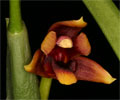|
|
|
|
|
| |
Established Seedlings of
Maxillaria variabilis 'Yellow' × 'Red' |
|
| |
|
|
| |
| Number: |
TN1525 |
| Name: |
Maxillaria variabilis 'Yellow' × 'Red'
|
| Type: |
outcross (What's that?) |
|
Seed Donor: |
Dale Borders
|
|
Click to Enlarge

Pod Parent Flowers |
Click to Enlarge

Pollen Parent Flower |
Click to Enlarge

Offspring 'MC4607' Flower |
Click to Enlarge

Offspring 'MC4186' Flower |
| Offspring photos are siblings of the plants you would receive. |
|
|
|
| |
Culture Notes from Donor: Parent plants: Temperature range I (60-83°F)
Comments: Floriferous and easily grown species. Flowers most months of the year.
For additional origin/habitat information supplied courtesy of
Charles and Margaret Baker, see further below, near the bottom of this page.
|
Temperatures we attempt to use in the lab & greenhouse:
| For Species: |
|
Spring, Summer, Autumn: days average 82°F, nights 60°F; best fit is Intermediate 83-60°F
(Source:
Baker's Web OSC) |
| For Species: |
|
Winter: days average 79°F, nights 49°F; best fit is Cool 70-52°F
(Source:
Baker's Web OSC) |
|
About the name...
| Etymology of |
Maxillaria |
|
From Latin "maxilla" jawbone.
(Source:
Pridgeon 1992) |
| Etymology of |
variabilis |
|
From Latin "variabilis" variable, different.
(Source:
Mayr & Schmucker 1998) |
| Pronunciation of |
Maxillaria |
|
max-ill-AIR-ee-a
(Source:
Pridgeon 1992) |
| Pronunciation of |
variabilis |
|
va-ree-AH-bi-lis
(Source:
Hawkes 1978) |
|
If you would like to direct someone to this web page, please copy and paste this URL into your email:
http://troymeyers.com/d?121525
ESTABLISHED SEEDLINGS
of these are not currently available.
We do not have any unsold in the greenhouse, but may offer them in the future.
Click here to see if we have flasks available.
|
|
|
| |
The origin/habitat information below is supplied courtesy of Charles and Margaret Baker
The following information is based on the name of the plant provided by the donor, and assumes that the name is correct. If the plant has been misidentified, then the following information may not be correct.
This text is copyrighted by the Bakers and may not be reproduced without permission.
ORIGIN/HABITAT: Central America, from Mexico to Panama. This orchid grows
on trees, rocks, or the surface of the ground in a variety of habitats. In
Mexico, plants are found in the states of Chiapas, Colima, Durango,
Guerrero, Hidalgo, Jalisco, México, Michoacán, Nayarit, Oaxaca, Puebla,
Sinaloa, and Veracruz. Plants grow on oak trees in pastures, open forests,
and dense forests at elevations up to 6550 ft. (2000 m). In Guatemala,
plants are found in mountain areas throughout the country, growing in open
or densly humid forests at elevations up to 6250 ft. (1900 m). In El
Salvador, plants grow in several locations at 2150-4600 ft. (650-1400 m).
In Nicaragua, plants are found in the mountains north of Managua at
3300-4900 ft. (1000-1500 m).
More about this information and the Bakers...
|
|
|
| |
|
|
|